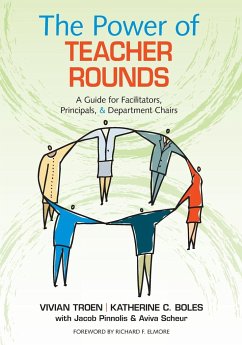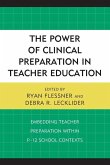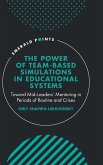Vivian Troen, Katherine C. Boles
The Power of Teacher Rounds
A Guide for Facilitators, Principals, & Department Chairs
Vivian Troen, Katherine C. Boles
The Power of Teacher Rounds
A Guide for Facilitators, Principals, & Department Chairs
- Broschiertes Buch
- Merkliste
- Auf die Merkliste
- Bewerten Bewerten
- Teilen
- Produkt teilen
- Produkterinnerung
- Produkterinnerung
The definitive, step-by-step guide for conducting teacher rounds! With teacher rounds, educators benefit from the observant peer learning that's common in other demanding fields. From practical strategies to ready
Andere Kunden interessierten sich auch für
![The Power of Clinical Preparation in Teacher Education The Power of Clinical Preparation in Teacher Education]() The Power of Clinical Preparation in Teacher Education59,99 €
The Power of Clinical Preparation in Teacher Education59,99 €![The Power of Clinical Preparation in Teacher Education The Power of Clinical Preparation in Teacher Education]() The Power of Clinical Preparation in Teacher Education110,99 €
The Power of Clinical Preparation in Teacher Education110,99 €![The Power of Expert Teaching The Power of Expert Teaching]() Shane N. PhillipsonThe Power of Expert Teaching205,99 €
Shane N. PhillipsonThe Power of Expert Teaching205,99 €![The Power of Helping Hands The Power of Helping Hands]() JagadeeshThe Power of Helping Hands14,99 €
JagadeeshThe Power of Helping Hands14,99 €![The Secret and Power of Self-Belief The Secret and Power of Self-Belief]() JagadeeshThe Secret and Power of Self-Belief16,99 €
JagadeeshThe Secret and Power of Self-Belief16,99 €![The Power of Team-based Simulations in Educational Systems The Power of Team-based Simulations in Educational Systems]() Orly Shapira-LishchinskyThe Power of Team-based Simulations in Educational Systems71,99 €
Orly Shapira-LishchinskyThe Power of Team-based Simulations in Educational Systems71,99 €![The Secret Power of Positive Self-Talk The Secret Power of Positive Self-Talk]() JagadeeshThe Secret Power of Positive Self-Talk16,99 €
JagadeeshThe Secret Power of Positive Self-Talk16,99 €-
-
-
The definitive, step-by-step guide for conducting teacher rounds! With teacher rounds, educators benefit from the observant peer learning that's common in other demanding fields. From practical strategies to ready
Hinweis: Dieser Artikel kann nur an eine deutsche Lieferadresse ausgeliefert werden.
Hinweis: Dieser Artikel kann nur an eine deutsche Lieferadresse ausgeliefert werden.
Produktdetails
- Produktdetails
- Verlag: Corwin
- Seitenzahl: 176
- Erscheinungstermin: 9. Mai 2014
- Englisch
- Abmessung: 254mm x 178mm x 10mm
- Gewicht: 344g
- ISBN-13: 9781483349954
- ISBN-10: 1483349950
- Artikelnr.: 40033612
- Herstellerkennzeichnung
- Libri GmbH
- Europaallee 1
- 36244 Bad Hersfeld
- gpsr@libri.de
- Verlag: Corwin
- Seitenzahl: 176
- Erscheinungstermin: 9. Mai 2014
- Englisch
- Abmessung: 254mm x 178mm x 10mm
- Gewicht: 344g
- ISBN-13: 9781483349954
- ISBN-10: 1483349950
- Artikelnr.: 40033612
- Herstellerkennzeichnung
- Libri GmbH
- Europaallee 1
- 36244 Bad Hersfeld
- gpsr@libri.de
See Vivian and Katherine¿s Presenter Profile Here! VIVIAN TROEN and KATHERINE C. BOLES Considered authorities on the subjects of teacher education, teacher leadership, and professional development schools, Troen and Boles deliver workshops on Teacher Teams and Teacher Leadership, speak at conferences and seminars, and regularly consult to schools and school districts in the United States and internationally. As classroom teachers, they founded one of the nation's first professional development schools to link colleges and public schools in partnerships for the preservice education of teachers as well as the ongoing professional development of veteran teachers. They are the authors of Who's Teaching Your Children: Why The Teacher Crisis is Worse Than You Think and What Can Be Done About It (Yale University Press, 2003) as well as numerous articles and book chapters on teachers and teaching. Most recently they have joined national leaders of professional organizations of educators, state education agencies and universities in the Teacher Leadership Exploratory Consortium, convened by the Educational Testing Service (ETS) to develop model national standards for teacher leadership. Troen co-directs the Induction Partnership Initiative at Brandeis University, guiding schools in developing the capacity to support new teachers. She also leads school administrators in regularly scheduled online, networked seminars investigating a wide range of issues surrounding induction practices and professional development for new and experienced teachers.
Forward Introduction Getting from Then to Now Implementing the Common Core State Standards About this Book Part I - Background 1. What is Rounds? Rounds is a Unique Form of Professional Development A Rounds Group in Action: A True-to-Life Story Pre Rounds Meeting - Choosing a Compelling Problem of Practice Preparing the Host Teacher Observing the Host Teacher Teach Debriefing the Observation Committing to a Change of Practice It
s a Circular Path to Perfection 2. Why Do Rounds? Rounds Creates a Framework for Critical Colleagueship Rounds Facilities the Sharing for Successful Practice Rounds Helps Develop a Shared Vision of Good Teaching Rounds is Low-Cost, High-Impact Strategy for Implementing the Common Core State Standards Rounds is Aligned With Learning Forward
s Standards for Professional Learning 3. Who Does Rounds? The Rounds Group Challenges for the Group The Rounds Facilitators Challenges for Facilitators Facilitator Study Groups The Host Teacher Preparation for the Observation Following the Observation Part II - Facilitators 4. How to Prepare for Rounds Step 1: Lay Groundwork for Collaboration Establish Norms Learn How to Observe: Conduct A Rounds Observation Workshop Step 2: Conduct the Introduction to Rounds Meeting 5. How to Implement Rounds Step 1: Facilitator Prepares the Host Teacher Supporting the Host Teacher in Preparing the Form Using the Host Teacher Preparation Form Don
t Forget the Kids Step 2: Rounds Group Observes the Host Teacher
s Class Step 3: Group Debriefs the Observation Step 4: Group Conducts the Next Rounds Meeting Developing a list of Common Criteria Step 5: Teachers Share a Record of Practice Examples of Commitments to Change and Records of Practice 6. Year-End Wrap-Up Has the Work Improved Student Learning? The Answer is Yes! Video Case: Examining One Teacher
s Change of Practice Framing the Context The Power of Teacher Rounds End of Year Reflection 7. Case & Guides to Case Analysis Using Cases to Facilitate Discussion of Issues Confronting Rounds Groups How and When to Use Cases Ideally Alternatively Part III - Principals & Department Chairs 8. Role of the Principal Understand what Rounds Requires Assess Teacher Talent Choose the Best Candidates Lay the Cultural Groundwork Build on Firm Ground With Good Resources Provide Ongoing Support 9. Rounds for Department Chairs: Improving High School Teacher Development & Supervision Department Chairs Step Up Pull the Lever The Difference Between Department Chair Rounds and Faculty Rounds How to Implement Department Chair Rounds Build a Culture of Trust Select your DCR Facilitator Facilitator Frames Rounds Prepare the Department Chair Host Choose a Compelling Problem of Practice Prepare for the Round Follow the Protocol for Debriefing Watch the Video Practice our Post-Observation Conference End Game Make an End Game Checklist Part IV - Appendices A. CCSS Speaking and Listening Standard 6-12 B. Glendäs Host Teacher Preparation Form C. Glendäs Record of Practice D. Observation Workshop: Learning to See, Unlearning to Judge E. Example of a Problem Aligned to the Common Core State F. Alex
s Host Teacher Preperation Form G. Alex
s Student Slides H: Alex
s Student Email Response References
s a Circular Path to Perfection 2. Why Do Rounds? Rounds Creates a Framework for Critical Colleagueship Rounds Facilities the Sharing for Successful Practice Rounds Helps Develop a Shared Vision of Good Teaching Rounds is Low-Cost, High-Impact Strategy for Implementing the Common Core State Standards Rounds is Aligned With Learning Forward
s Standards for Professional Learning 3. Who Does Rounds? The Rounds Group Challenges for the Group The Rounds Facilitators Challenges for Facilitators Facilitator Study Groups The Host Teacher Preparation for the Observation Following the Observation Part II - Facilitators 4. How to Prepare for Rounds Step 1: Lay Groundwork for Collaboration Establish Norms Learn How to Observe: Conduct A Rounds Observation Workshop Step 2: Conduct the Introduction to Rounds Meeting 5. How to Implement Rounds Step 1: Facilitator Prepares the Host Teacher Supporting the Host Teacher in Preparing the Form Using the Host Teacher Preparation Form Don
t Forget the Kids Step 2: Rounds Group Observes the Host Teacher
s Class Step 3: Group Debriefs the Observation Step 4: Group Conducts the Next Rounds Meeting Developing a list of Common Criteria Step 5: Teachers Share a Record of Practice Examples of Commitments to Change and Records of Practice 6. Year-End Wrap-Up Has the Work Improved Student Learning? The Answer is Yes! Video Case: Examining One Teacher
s Change of Practice Framing the Context The Power of Teacher Rounds End of Year Reflection 7. Case & Guides to Case Analysis Using Cases to Facilitate Discussion of Issues Confronting Rounds Groups How and When to Use Cases Ideally Alternatively Part III - Principals & Department Chairs 8. Role of the Principal Understand what Rounds Requires Assess Teacher Talent Choose the Best Candidates Lay the Cultural Groundwork Build on Firm Ground With Good Resources Provide Ongoing Support 9. Rounds for Department Chairs: Improving High School Teacher Development & Supervision Department Chairs Step Up Pull the Lever The Difference Between Department Chair Rounds and Faculty Rounds How to Implement Department Chair Rounds Build a Culture of Trust Select your DCR Facilitator Facilitator Frames Rounds Prepare the Department Chair Host Choose a Compelling Problem of Practice Prepare for the Round Follow the Protocol for Debriefing Watch the Video Practice our Post-Observation Conference End Game Make an End Game Checklist Part IV - Appendices A. CCSS Speaking and Listening Standard 6-12 B. Glendäs Host Teacher Preparation Form C. Glendäs Record of Practice D. Observation Workshop: Learning to See, Unlearning to Judge E. Example of a Problem Aligned to the Common Core State F. Alex
s Host Teacher Preperation Form G. Alex
s Student Slides H: Alex
s Student Email Response References
Forward Introduction Getting from Then to Now Implementing the Common Core State Standards About this Book Part I - Background 1. What is Rounds? Rounds is a Unique Form of Professional Development A Rounds Group in Action: A True-to-Life Story Pre Rounds Meeting - Choosing a Compelling Problem of Practice Preparing the Host Teacher Observing the Host Teacher Teach Debriefing the Observation Committing to a Change of Practice It
s a Circular Path to Perfection 2. Why Do Rounds? Rounds Creates a Framework for Critical Colleagueship Rounds Facilities the Sharing for Successful Practice Rounds Helps Develop a Shared Vision of Good Teaching Rounds is Low-Cost, High-Impact Strategy for Implementing the Common Core State Standards Rounds is Aligned With Learning Forward
s Standards for Professional Learning 3. Who Does Rounds? The Rounds Group Challenges for the Group The Rounds Facilitators Challenges for Facilitators Facilitator Study Groups The Host Teacher Preparation for the Observation Following the Observation Part II - Facilitators 4. How to Prepare for Rounds Step 1: Lay Groundwork for Collaboration Establish Norms Learn How to Observe: Conduct A Rounds Observation Workshop Step 2: Conduct the Introduction to Rounds Meeting 5. How to Implement Rounds Step 1: Facilitator Prepares the Host Teacher Supporting the Host Teacher in Preparing the Form Using the Host Teacher Preparation Form Don
t Forget the Kids Step 2: Rounds Group Observes the Host Teacher
s Class Step 3: Group Debriefs the Observation Step 4: Group Conducts the Next Rounds Meeting Developing a list of Common Criteria Step 5: Teachers Share a Record of Practice Examples of Commitments to Change and Records of Practice 6. Year-End Wrap-Up Has the Work Improved Student Learning? The Answer is Yes! Video Case: Examining One Teacher
s Change of Practice Framing the Context The Power of Teacher Rounds End of Year Reflection 7. Case & Guides to Case Analysis Using Cases to Facilitate Discussion of Issues Confronting Rounds Groups How and When to Use Cases Ideally Alternatively Part III - Principals & Department Chairs 8. Role of the Principal Understand what Rounds Requires Assess Teacher Talent Choose the Best Candidates Lay the Cultural Groundwork Build on Firm Ground With Good Resources Provide Ongoing Support 9. Rounds for Department Chairs: Improving High School Teacher Development & Supervision Department Chairs Step Up Pull the Lever The Difference Between Department Chair Rounds and Faculty Rounds How to Implement Department Chair Rounds Build a Culture of Trust Select your DCR Facilitator Facilitator Frames Rounds Prepare the Department Chair Host Choose a Compelling Problem of Practice Prepare for the Round Follow the Protocol for Debriefing Watch the Video Practice our Post-Observation Conference End Game Make an End Game Checklist Part IV - Appendices A. CCSS Speaking and Listening Standard 6-12 B. Glendäs Host Teacher Preparation Form C. Glendäs Record of Practice D. Observation Workshop: Learning to See, Unlearning to Judge E. Example of a Problem Aligned to the Common Core State F. Alex
s Host Teacher Preperation Form G. Alex
s Student Slides H: Alex
s Student Email Response References
s a Circular Path to Perfection 2. Why Do Rounds? Rounds Creates a Framework for Critical Colleagueship Rounds Facilities the Sharing for Successful Practice Rounds Helps Develop a Shared Vision of Good Teaching Rounds is Low-Cost, High-Impact Strategy for Implementing the Common Core State Standards Rounds is Aligned With Learning Forward
s Standards for Professional Learning 3. Who Does Rounds? The Rounds Group Challenges for the Group The Rounds Facilitators Challenges for Facilitators Facilitator Study Groups The Host Teacher Preparation for the Observation Following the Observation Part II - Facilitators 4. How to Prepare for Rounds Step 1: Lay Groundwork for Collaboration Establish Norms Learn How to Observe: Conduct A Rounds Observation Workshop Step 2: Conduct the Introduction to Rounds Meeting 5. How to Implement Rounds Step 1: Facilitator Prepares the Host Teacher Supporting the Host Teacher in Preparing the Form Using the Host Teacher Preparation Form Don
t Forget the Kids Step 2: Rounds Group Observes the Host Teacher
s Class Step 3: Group Debriefs the Observation Step 4: Group Conducts the Next Rounds Meeting Developing a list of Common Criteria Step 5: Teachers Share a Record of Practice Examples of Commitments to Change and Records of Practice 6. Year-End Wrap-Up Has the Work Improved Student Learning? The Answer is Yes! Video Case: Examining One Teacher
s Change of Practice Framing the Context The Power of Teacher Rounds End of Year Reflection 7. Case & Guides to Case Analysis Using Cases to Facilitate Discussion of Issues Confronting Rounds Groups How and When to Use Cases Ideally Alternatively Part III - Principals & Department Chairs 8. Role of the Principal Understand what Rounds Requires Assess Teacher Talent Choose the Best Candidates Lay the Cultural Groundwork Build on Firm Ground With Good Resources Provide Ongoing Support 9. Rounds for Department Chairs: Improving High School Teacher Development & Supervision Department Chairs Step Up Pull the Lever The Difference Between Department Chair Rounds and Faculty Rounds How to Implement Department Chair Rounds Build a Culture of Trust Select your DCR Facilitator Facilitator Frames Rounds Prepare the Department Chair Host Choose a Compelling Problem of Practice Prepare for the Round Follow the Protocol for Debriefing Watch the Video Practice our Post-Observation Conference End Game Make an End Game Checklist Part IV - Appendices A. CCSS Speaking and Listening Standard 6-12 B. Glendäs Host Teacher Preparation Form C. Glendäs Record of Practice D. Observation Workshop: Learning to See, Unlearning to Judge E. Example of a Problem Aligned to the Common Core State F. Alex
s Host Teacher Preperation Form G. Alex
s Student Slides H: Alex
s Student Email Response References








